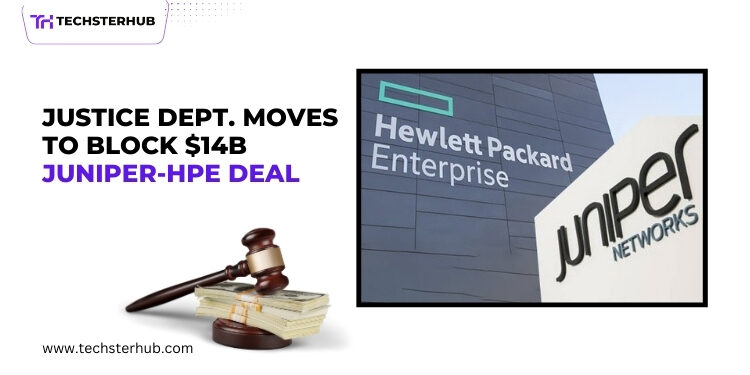The U.S. Department of Justice (DOJ) initiated legal action to block Hewlett Packard Enterprise’s (HPE) proposed acquisition of Juniper Networks which is valued at $14 billion. The government claims the merger will damage tech industry competition which would hurt consumers through fewer options and higher prices. This summary explains what you need to understand about how this event affects the technology industry.
What is the Deal About?
The American multinational technology firm Hewlett Packard Enterprise (HPE) decided to purchase Juniper Networks for a sum of $14 billion. Juniper Networks stands as a top provider in networking solutions with products including routers and switches for worldwide data centers and communication networks.
HPE entered into this agreement to expand its power within the networking business. HPE’s acquisition of Juniper will allow them to grow their market share while providing customers with a more diverse range of networking solutions.
The Department of Justice takes legal action against the merger because it believes it will result in unfair industry practices.
Why Does the Government Want to Block the Deal?
According to the Department of Justice allowing the HPE-Juniper merger would decrease direct competition between these two firms and could limit competition among other companies in this market sector. Here are the key reasons the government is concerned:
- Less Competition: HPE and Juniper Networks dominate the networking equipment sector and their merger would decrease the number of available competitors leading to limited options for businesses which could subsequently result in higher prices for networking products.
- Potential Price Increases: If fewer companies compete in the networking equipment market, then companies would face less pressure to lower prices or improve services which could lead to higher prices for businesses that need networking equipment and both small businesses and large corporations could face difficulties with these increased costs.
- Impact on Innovation: Competition drives companies to create innovative products and better services but the DOJ worries the merger of two powerful companies will reduce these innovation incentives.
- Job Losses: Job cuts frequently happen when large mergers merge company operations together, but the Department of Justice expresses concern over the potential job losses at HPE and Juniper which would negatively affect employees and their families.
What is the Industry Reaction?
The tech industry is abuzz following the DOJ’s lawsuit announcement. Industry leaders and experts are monitoring the case development attentively. The merger could provide consumer benefits because businesses would gain access to a broader assortment of services from a single company. Other experts concur with the DOJ that the proposed deal would reduce competitive dynamics in the market.
Hewlett Packard Enterprise maintains that this merger will not lead to any competitive disadvantages. Hewlett Packard Enterprise claims that merging with Juniper will generate more innovative solutions for customers. Hewlett Packard Enterprise believes it has solutions to resolve government objections and advance with the agreement.
Juniper Networks has shown support for the merger because the combined entity will have a competitive advantage in a fast-evolving market.
What Happens Next?
Current proceedings have stopped the transaction until further resolution. The companies HPE and Juniper plan to fight their legal battle in court to support their claim that the merger should continue. The Department of Justice plans to maintain its position that the merger will negatively impact competition and consumer welfare.
Should the court side with the DOJ the entire merger stands to be blocked. The acquisition could proceed if the court rules for HPE and Juniper but the Department of Justice can challenge the decision through an appeal.
What Does This Mean for Consumers?
This legal case may appear remote to regular consumers yet it holds significant consequences. This legal dispute will determine how competition evolves in the technology sector especially concerning networking technologies. Blocking this merger may create more market competition which would result in improved products and decreased prices.
Approval of this merger would establish a benchmark that could lead other large technology companies to initiate similar mergers which may result in increased industry consolidation. Businesses and consumers would find themselves with fewer choices which restricts access to both cost-effective and groundbreaking solutions.
Why is This Case Important?
This legal case between the DOJ and companies HPE and Juniper Networks extends beyond the particulars of their merger. The case demonstrates why competition matters in technology industries. Competition among companies leads to improved products, reduced prices and enhanced services as they strive to outperform their rivals. Complacency sets in among companies when competition disappears and consumers face higher costs as a result.
The legal action directs focus to governmental responsibilities concerning merger and acquisition oversight. Worldwide governments monitor corporate transactions to prevent consumer harm and the formation of monopolies. This case result may dictate future handling of tech industry mergers.
Conclusion
The Department of Justice’s lawsuit against the $14 billion merger between Hewlett Packard Enterprise and Juniper Networks illustrates the crucial role competition maintains in the technology sector. Hewlett Packard Enterprise and Juniper Networks think their merger will help consumers and businesses while the Department of Justice fears it could harm competition and innovation while causing price changes. The verdict in this legal case may establish an important legal standard for the technology sector going forward. The progression of this case will capture the attention of both tech companies and experts along with everyday consumers who want to know what will happen next.











